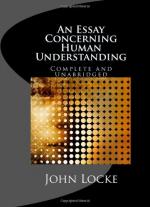
|
| Name: _________________________ | Period: ___________________ |
This test consists of 5 short answer questions, 10 short essay questions, and 1 (of 3) essay topics.
Short Answer Questions
1. What happens when you strip away all the details of a thing, in Locke's account?
2. What is a power, according to Locke?
3. What does Locke say is the purpose of language?
4. How can we understand the properties of things, according to Locke?
5. What happens to the man in the illustration?
Short Essay Questions
1. What role does Locke attribute to God in forming man as a language-user?
2. What is the debate between determinists and libertarians?
3. How does Locke define power, in "Essay Concerning Human Understanding"?
4. What is abstraction, according to Locke?
5. What do we do when we define a word, in Locke's account?
6. What is the correspondence theory of truth?
7. What does Locke achieve by claiming that good and evil come from pleasure and pain?
8. How is love like memory, in Locke's account?
9. Why are most words general, according to Locke?
10. What problem is Locke trying to address with his discussion of identity in consciousness and identity in body?
Essay Topics
Write an essay for ONE of the following topics:
Essay Topic 1
What was the historical effect of Locke's philosophy? What preceded it, and what proceeded from it? What historical development can Locke's work be seen as a part of? Describe his place in that development.
Essay Topic 2
Write a character sketch of the author based on his style and content. What values does he hold dear? What are his hopes and fears? What kind of person do you think he is? Anchor your sketch in passages in the book.
Essay Topic 3
How does Locke reconcile his empirical epistemological philosophy with spiritual or non-sensual or other-worldly experience? Do metaphysical questions simply have to be avoided, in Lockean philosophy, or is there a way to account for them?
|
This section contains 937 words (approx. 4 pages at 300 words per page) |

|




